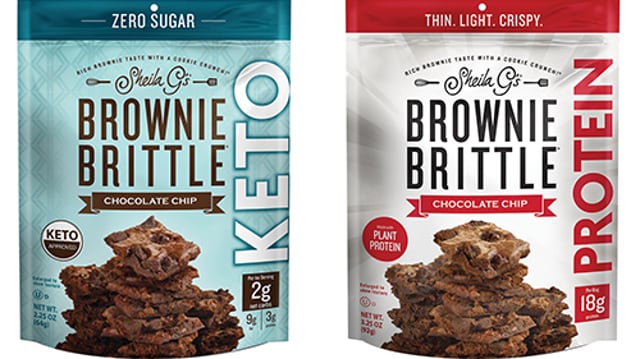Healthier Treats Gain More Important Role
With millions of Americans hunkered down in their homes, waiting for the orders to restart some semblance of life as we knew it before the coronavirus pandemic roared into being, people have been dealing with the understandable stress of this time in myriad ways: binge-watching Netflix, cleaning their houses from top to bottom, and, yes, partaking of comfort foods that include candy and snacks. While even at the best of times, U.S. consumers enjoy treats as part of their overall diet, the public health crisis affecting the world has only made such accessible pleasures all the more meaningful.
Key Takeaways
- The coronavirus pandemic has led to a significant increase in online snack sales, with many consumers opting for healthier offerings.
- Candy and snack makers have had to change the way they do business, shifting much of their sales efforts online, while ensuring availability of trusted products in stores. Meanwhile, retailers interested in growing the categories can focus on multiple store placements and value-priced private-brand items that can be promoted for their wellness attributes and great taste.
- While short-term consumer habits have definitely evolved in response to the outbreak, it’s still unclear what the long-term behavioral impacts will be.
“In the current situation, snack discovery and impulse purchases have subsided, with consumers limiting excessive aisle browsing,” notes Bob DiNunzio, director of category strategy at Stamford, Conn.-based Daymon. “Snack purchase behavior has changed significantly due to COVID-19 — with a 46% increase in total core snack online sales versus last year.”
According to Resonate, a Reston, Va.-based provider of AI-powered consumer data and intelligence, shoppers who are particularly concerned about COVID-19, as evidenced by their media consumption, are demonstrating the following behaviors more than people who aren’t as concerned about COVID-19 (i.e., not consuming content about the virus): They’re more likely to buy filling snacks like meal replacements, nuts and seeds, and yogurt; they’re more likely to be buying snacks for their significant others than for themselves; and healthy and nonprocessed foods are becoming more important to these individuals.
Shifting Gears
Speaking of better-for-you (BFY) candy and snacks, makers of such products have stepped up to ensure that consumers are still able to purchase them.
“With the recent pandemic, and more consumers staying home, we are quickly shifting our business to focus on how we can improve our online presence with both retailers and our direct website,” says Ashley Dawkins, VP of marketing for West Palm Beach, Fla.-based Sheila G’s Brownie Brittle, whose forthcoming products include Brownie Brittle Keto and Brownie Brittle Protein, both launching by the end of the month. “That means offering more of our items on Instacart, extending coupon offers on mass retailer websites, and putting more marketing funds behind efforts of brand awareness online. There is definitely a shift in how we’re seeing consumers buy our product.”
“We know that tasting is believing when it comes to snacking, so we’ve historically prioritized in-store demonstrations and live sampling as a key shopper marketing vehicle,” observes Poorvi Patodia, founder and CEO of Biena Snacks, a Boston-based maker of nutrient-filled roasted chickpea snacks and chickpea puffs. “With COVID-19, this is no longer an option for so many reasons. We have had to shift to be more creative about how we introduce Biena to new consumers and stay top of mind for existing fans. This includes looking at digital marketing tools and social media as a way to drive both awareness and trial for the brand.”
According to Patodia, “Our current priority is keeping our snacks stocked on shelves and online for consumers looking for better-for-you options that also taste great while adhering to self-isolation recommendations.”
One giant in the category, Mars Wrigley, has expanded the concept of “health” beyond product offerings during the outbreak, by choosing to focus particularly on corporate responsibility activities. Nevertheless, in the BFY space, the company has launched 100-calorie bars across a variety of its chocolate brands in the United States, and maintains a strategic partnership with New York-based bar maker KIND that “has strengthened the broader global snacking category with additional options featuring whole nuts, fruits and whole grains,” according to James Mills, the Hackettstown, N.J.-based company’s global VP of category leadership.
“For Mars Wrigley, our first priority is to protect the health and well-being of our 35,000 associates worldwide and the quality of the products they make every day,” explains Mills. ”For us, it’s about action. The global Mars Wrigley Foundation will provide $3 million of financial relief as a part of Mars Inc.’s $20 million cash and in-kind donation to support the people, pets and communities most affected by COVID-19. In addition, Mars Wrigley U.S. has pledged to give $1 million in product donations to front-line health care and essential workers.”
He adds: “Across the globe, our brands have rallied to support front-line workers as well. ... In the U.S., M&M’s donated $50,000 to Operation Gratitude and will send 5,000 ‘thank you’ packs to front-line workers.”
When it comes to in-store merchandising, meanwhile, Mills points out that Mars Wrigley is “advising our retail partners [to] focus on the availability of the best-selling, trusted brands that shoppers love and that help them smile in difficult times.”
Private Matters
Noting that “[r]etailers have an opportunity to provide unique solutions in their private-brand programs by creating new varieties of protein-rich meat jerky and bean-based snacking formats (puffs, curls, etc),” Daymon’s DiNunzio counsels grocers to promote and sell “innovative private-brand snack products online, to increase visibility while addressing consumers’ ‘get in, get out,’ brick-and-mortar shopping mentality.”
Advising on the development of BFY items, he emphasizes: “Taste remains the No. 1 driver of snack purchases. When creating healthy alternatives, manufacturers need to ensure they taste great, but also provide flavor varieties to meet the demand of different consumers. We are seeing innovation with new flavor varieties of vegetable and multigrain snacks, which have largely contributed to the increase in sales versus last year.”
On the subjects of placement and promotion, DiNunzio says: “Success for brands in these categories is less about merchandising and more about communicating product benefits. Brands must be able to clearly communicate product wellness benefits on pack and at the point of sale. However, healthy products that promote their great taste will provide the strongest influence to purchase.”
In regard to the current crisis, he admits, “Budget constraints can inhibit shoppers from purchasing BFY snacks with higher-quality or organic ingredients during this unprecedented time,” adding, however, that “[r]etailers can leverage private-brand solutions to provide all shoppers with affordable and innovative snacking options.”
More Places in Stores
In physical locations — where 70% of Americans are still purchasing groceries, even in the midst of the pandemic, according to the Toluna and Harris Interactive COVID-19 Barometer for the period of April 9-14 — placement beyond the candy and snack sections can help draw shoppers to BFY offerings.
“Our business has always seen a dramatic increase in sales when we can be displayed properly at retail,” affirms Dawkins, of Sheila G’s Brownie Brittle. “Our most recent offering for retailers is our dump bin, which allows retailers to easily and quickly display 144 of our single-serve 1-ounce product at the checklane for impulse purchase. We then added a discount QR code on the side of the dump bin so consumers can access a $1-off coupon for their next 5-ounce purchase — a win-win for both our brand and [the] retailer, [as it] encourages consumers to return to the store and purchase another, larger bag of our product with an easily accessible online coupon that can be scanned at checkout.”
Lehi Valley, a Mesa, Ariz.-based maker of mostly private label snack solutions that has just launched a three-SKU line of grain-free, non-GMO, gluten-free, low-sugar and higher-protein granolas to round out its granola lineup, is quick to note that the product gives retailers various in-store placement options. “With granolas, many retailers are merchandising that product in bakeries, above yogurt sections in stores and in snack aisles in order to capitalize on different use options for that category, other than just bars or bites,” observes Christie Frazier-Coleman, the company’s VP sales and marketing.
Future Impact
In a world where multi-daypart snacking and online snack purchases were already on the rise before the coronavirus outbreak occurred, according to Mintel and The NPD Group, respectively, has this life-altering event solidified those tendencies, irrevocably changing how Americans discover and eat candy and snacks, BFY or not? In the short term, at least, the answer would seem to be yes.
“With our current way of life in the wake of COVID-19, we could see a few different trends gain prevalence,” predicts Biena Snacks’ Patodia. “For example, there’s potential for growth in single-serve snack offerings. In a time when people are concerned about social contact, snacks shared out of a bag or a bowl don’t make sense. There’s also opportunity for nostalgic flavors to bring a sense of comforting familiarity to everyday snacking, and, of course, variety, as people have to rely more on at-home options to satisfy cravings.”
A further look into the future is still shrouded in uncertainty, however. As Lehi Valley’s Frazier-Coleman admits, “The long-term impact to the ways that people eat is yet to be realized.”















